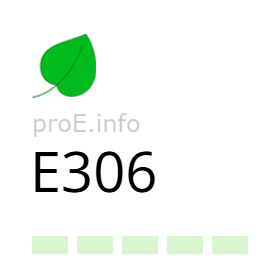
Other names for the additive (synonyms)
General information
Additive E306 is a plant extract rich in tocopherols, which are fat-soluble vitamins essential for the human body (vitamin E).
In the food industry, additive E306 is used as an antioxidant. Tocopherols slow down the peroxidation of lipids, protecting fats and oils from rancidity and quality loss.
Historically, vitamin E was discovered as a factor preventing specific disorders in animals. Later, its antioxidant properties became the basis for its wide use in food technology and dietetics.
Additive E306 is a mixture of natural tocopherol isomers derived from vegetable oils (soybean, sunflower, corn, etc.). It dissolves well in fats, is stable to moderate heating in the absence of air, but is sensitive to light and oxygen.
Industrially, additive E306 is obtained from by-products of vegetable oil processing (for example, deodorizer distillates). It is then purified and concentrated to meet specifications for food use.
Unlike synthetic forms of vitamin E, such as α-tocopherol (additive E307), antioxidant E306 has a natural origin, although its composition can be standardized for technological purposes.
Effects on the body
Benefits of additive E306
Tocopherols are essential fat-soluble vitamins and play an important role in the antioxidant defense of the body. They support the health of cell membranes and are involved in a number of metabolic processes.
As a source of natural vitamin E, tocopherol extract performs an antioxidant function in the body: neutralizing free radicals, protecting polyunsaturated fatty acids in membranes, and stabilizing oxidation-sensitive nutrients (such as vitamin A and carotenoids). This helps maintain cell integrity and supports the normal functioning of the nervous and immune systems.
At food-level doses, characteristic of its use in the food industry, tocopherols are considered safe and even beneficial nutrients.
Risks of additive E306
In 2015, the safety and technological need of tocopherol mixtures were re-evaluated in the European Union. The EFSA Food Additives and Nutrient Sources Added to Food Committee concluded that the acute oral toxicity of tocopherols is low. Genotoxicity and carcinogenicity are not a concern for tocopherols.
The EU Scientific Committee on Food did not establish an Acceptable Daily Intake (ADI) for tocopherols, but defined a tolerable upper intake level for vitamin E of 300 mg/day for adults.
Overall, in its report, the EFSA Committee noted that additive E306 does not raise safety concerns at levels of use in food products.
When vitamin E is consumed in pharmacological doses, which significantly exceed the amounts of tocopherols in food products, several side effects may occur. The main one is an increased tendency to bleeding in the presence of vitamin K deficiency. High doses of vitamin E (especially above 800–1000 mg/day) may reduce the activity of vitamin K, which is involved in blood clotting processes.
Uses
In technological practice, additive E306 is mainly used as an antioxidant in fat-based matrices: vegetable oils and blends, margarines and spreads, mayonnaise and sauces, nut pastes, snack products and pastries with a high fat content, as well as cereal products where protection of the lipid phase is required.
Tocopherols effectively intercept radicals formed during autoxidation, thereby extending shelf life and preserving organoleptic properties.
In addition to preventing rancidity, additive E306 helps stabilize oxidation-sensitive ingredients (such as natural colorants and aromatic components), making antioxidant E306 highly valued in formulations of “clean-label products,” where the natural origin of the additive is appreciated.
Beyond the food industry, tocopherols are also used in other areas:
- Medicine and pharmaceuticals — as an antioxidant and component of vitamin complexes, for the prevention and treatment of diseases related to oxidative stress.
- Cosmetics — included in creams, serums, and skin and hair care products, protecting cells from damage and slowing down aging processes.
- Animal husbandry — added to feed to support animal health and extend feed shelf life.
- Chemical industry — used to stabilize oils, fats, and some polymers.
- Nutrition and sports supplements — included in dietary supplements to support the body’s antioxidant defense.
Legal Status
In the European Union, additive E306 is included in the list of authorized food additives under Regulation (EC) No 1333/2008 and is recognized as not raising concerns at actual use levels in foods.
Ukraine harmonizes its requirements with EU law, therefore additive E306 is permitted in the same functional roles and under comparable restrictions.
In the United States, tocopherols have GRAS status when used in accordance with good manufacturing practice. In Canada and Japan, tocopherols are also authorized as antioxidants in food products.
Specific maximum levels and areas of use are determined by national lists and technical regulations, which are generally consistent with international practice.